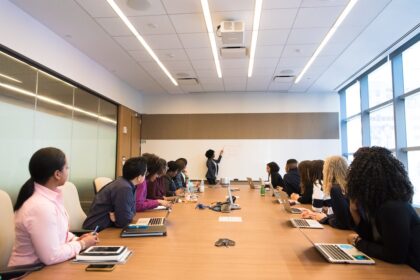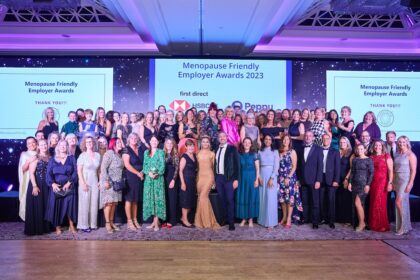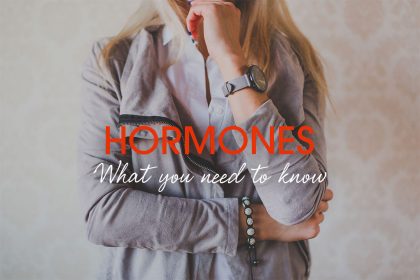Interview with Deborah Garlick, founder and CEO of Henpicked: Menopause In The Workplace
Find out how her own personal experience helped inspire Deborah Garlick, founder and CEO of Henpicked: Menopause In The Workplace to work for positive change regarding menopause and work.
And how this has led to Menopause Friendly Accreditation and the Menopause Friendly Employer Awards.
What’s your career background?
My background is actually a corporate one. My early career was in financial services, as a bank manager and head of a mortgage department.
I then moved into communications for corporates including Boots and E.ON before becoming a consultant supporting boards. Here, my role was primarily on how to communicate sensitively and accurately, cascading through the whole organisation to reach each team member.
I set up Henpicked.net 10 years ago, as a platform and community for women who weren’t born yesterday. This was really my first inkling of how important menopause was as a wider topic.
What was your first knowledge or experience of the menopause?
It was my own experience, rather scarily finding myself in hospital after struggling with pain for a year. It was only after I went private that this was finally diagnosed as menopause and I was prescribed HRT.
On a professional level, we noticed how much engagement our articles about menopause on Henpicked were getting, with more and more women sharing their stories. This made me realise that it must be having an impact at work, so seven years ago I wrote my first article on how menopause affects someone at work and what employers could do to support them.
And when did you become aware that it was such a significant issue?
The spike in traction every time we published a menopause article opened my eyes as to just how important it is that menopause is talked about openly – it is much more widely discussed now, but rewind 10 years and this really wasn’t the case. With the Henpicked community, I wrote a book, ‘Menopause: the change for the better’, aimed at supporting those going through menopause.
This led me to meeting with a research team from the Government Equalities Office who were exploring the topic of Menopause transition: effects on women’s economic participation which, once again, made me realise the interconnection with menopause and work.
I started to gauge the situation, talking to employers to see if anyone was doing anything menopause related. The answer for the most part was no. It was a big gap and a rather unsettling one given the scope of the impact of menopause at work.
What inspired you to take action, and what did that look like?
These conversations with employers made me realise it was less a lack of interest and more a lack of awareness stopping them putting support in place. I did some research as to what employers could do on a practical level and what employees were looking for.
This led me to setting up the first-ever Menopause in the Workplace Conference. It was a seminal event, acting as a springboard for many more events, workshops and our annual roadshows.
What barriers have you faced over the years in bringing awareness to and action on the menopause at work?
There is sometimes resistance from employers not appreciating or prioritising the need for menopause support. In some cases, this is from saturation in terms of mandatory policies meaning they don’t have the resources or energy for non-mandatory areas.
(At the moment, it isn’t compulsory for employers to have a menopause policy in place, but menopause is covered under the protected characteristics of sex, age and disability, so it’s important they are aware of this.)
Also, there isn’t currently much in the way of grants or funding, so this is something organisations need to do under their own steam, which can be difficult when finances are already stretched. We actually run free webinars which highlight the massive benefits and cost savings, which can sometimes surprise organisations. The facts and stats speak for themselves.
Of course, the pandemic also played havoc with our work, as it did with most areas of life. The world stopped. We had to think fast and completely revamped all our offerings, taking them online into webinars and podcasts, which proved very popular.
And what have been your proudest moments?
It’s really all about the difference I know this makes to people. We often get feedback from individuals thanking us for helping to raise awareness with their employers. It’s also very inspiring to see the many employers we’ve been able to help put the right support in place.
The first Menopause in the Workplace conference, seven years ago, was something of a lightbulb moment, with 45 organisations joining us. Looking back, it was incredibly rare to find any company with menopause support in place, so this was a great achievement. It was about showing them how to take action, what good looks like in terms of menopause support.
The Menopause Friendly Employer Awards have just taken place for the second time. These are a fantastic way for us to celebrate the great work organisations are doing, as well as to share this best practice.
Charities, small organisations and public bodies were on free seats, to make sure everyone was included. The winners ranged from a government department to a small football club and a multi-national insurance company and police force. It just goes to show the diversity of organisations taking action and seeing results.
The Awards also help us to offer practical support: we raised over £75K which will go to menopause charities and research.
This year saw the launch of Menopause Friendly Australia and in we’re about to launch a team in the US: both great opportunities to take our messages global. I’m proud to be working with them as they begin their journeys.
I also take great pride in our team. We know that one in four people think about leaving work due to menopause, and our brilliant people are so passionate about what they do and work tirelessly to change this, they are an inspiration to me. We’ve also just launched the Henpicked Menopause Training Network, which is a great way for us to make sure we’re reaching smaller organisations so that no company is left behind.
Why should companies care about the menopause, and invest in policies, training and accreditation?
We always say there are four reasons. The demographic case, which is to recognise that women over 50 are the fastest-growing workplace demographic. The legal case, which is that an increasing number of tribunals are being brought, and won, due to menopause discrimination.
The business case, which is the cost savings associated with employee retention and avoiding increased recruitment. And of course, the social responsibility case, which is simply that supporting your colleagues and helping them to be the best they can be at work is just the right thing to do.
What can they do? What support exists for them?
This is very individual depending on the type and size of organisation, the industry they’re in, the nature of their working environments and their culture. Some companies like to have a formal policy in place and a strong set of working practices and procedures. Others are less formal, preferring to have a guidance document, for example.
The key is to make sure everyone across the whole business knows that support is in place and how to access it. This could be anything from better ventilation to more flexible working. Menopause symptoms are many and varied, so it’s about working with individuals to see how they can support them best.
What is The Menopause Friendly Accreditation?
It’s a way for organisations to show that they’ve met a set of rigorous conditions and received the seal of approval from our Independent Panel of experts. As soon as a company applies, they receive a ‘Committed to being menopause friendly’ badge before going on to apply for accreditation. Essentially, they need to show evidence that they’ve put processes in place across a number of areas to support colleagues.
How did the Menopause Friendly Employer Awards come about?
The aim of The Menopause Friendly Accreditation was always about recognising and sharing best practice. The Awards are an extension of that, helping us to recognise organisations and individuals who have gone above and beyond in their pursuit of being Menopause Friendly.
Are you surprised by how they have taken off?
They’re really the result of a lot of hard work and progress over a number of years. When I first started talking about menopause at work it was something of an uphill battle to persuade employers this could change people’s working lives for the better.
Thankfully it’s a topic which has gained traction and is now growing at an exponential rate. I’m absolutely delighted that we’re seeing events like our Awards: to me that’s a sign we’ve come a long way in the right direction.
What’s your advice for women going through the menopause unsupported at work (or people impacted by the menopause)?
I always recommend checking first that your employer isn’t already offering something, so check on your intranet or with HR – many employers have something in place now. If they don’t, you could ask them why not?
Make the case for supporting menopause at work and offer to be involved in the process. This is how many of our award-winning organisations got started, by a passionate individual taking their ideas to senior managers.
Find out more about Henpicked: Menopause In The Workplace.










